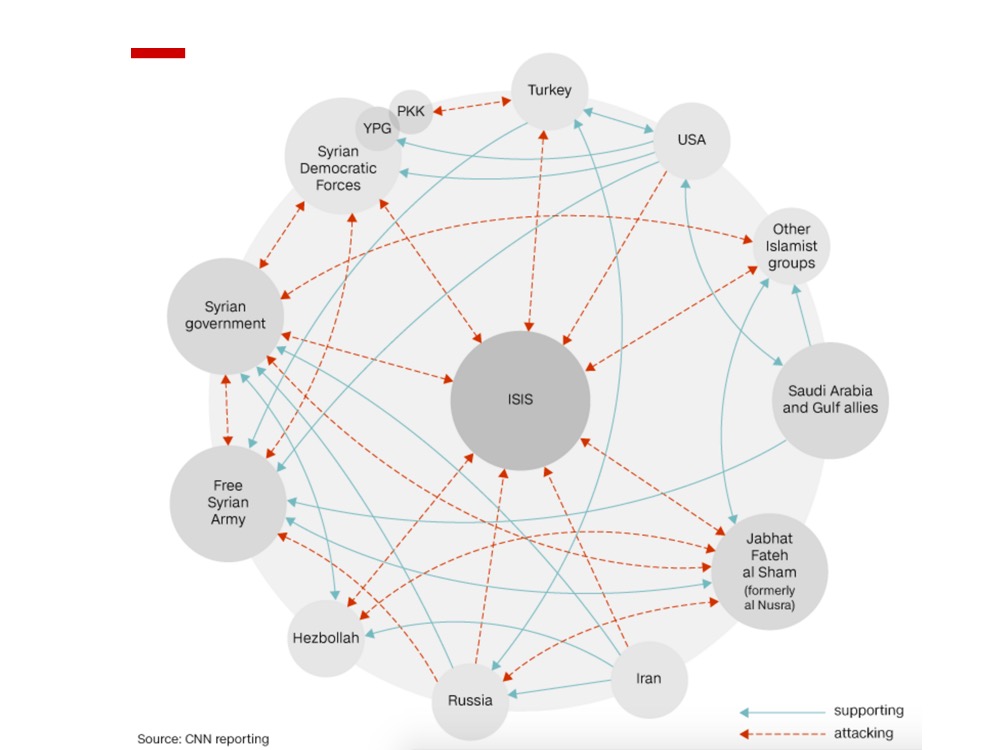[We’ll probably soften with Russia, possibly resulting in the Syria clusterfuck being resolved in Assad’s favor]
It's going to be resolved in Assad's favor, whether American policy towards Russia softens or not. His forces are the ones gaining ground against ISIS, not the rebels.
Most importantly, he's given permission for Iraqi forces to attack ISIS within Syrian borders. This actually means the US (via Iraq) recognizes his authority and is cooperating with him. Any Syrian "rebels" who can cash out their chips and leave Syria probably should do so, and very soon at that.
He's overseen what is probably the largest series of government-sanctioned and organized war crimes since the 1990s, but he is going to win. And that means he's probably not going to be punished beyond having to surrender the government to a brother, child, or cousin and living the rest of his life at some dacha on the Black Sea shore.
Interestingly, there have been rumors circulating in the Russian press that Assad suffered a stoke. This could be the cover under which he gives up power without facing punishment, allowing the Western human-rights faction to avoid the reality that he won't be held accountable for the Syrian government's war crimes.
The Russians don't care who rules Syria, as long as that person supports the presence of the Russian naval base at Tartus and opposes the natural gas pipeline Western nations desperately want built across Iraq and Syria in order to weaken Russian energy leverage over Europe. Therefore, they would probably be willing to let Assad retire. Assad, who was a London ophthalmology student and never intended to take over for his father, is probably willing to retire. And the West, which is offended by his conduct of the war but in no position to do anything about it, is probably willing to let him fade away.
The bigger question is what Iraq and Syria are going to look like when ISIS is gone. Kurdish groups hold areas in northern Iraq and Syria, Turkey holds a piece of northern Syria, and there are still substantial areas of southern and northern Syria held by anti-Assad groups.

Right now the US/NATO, which includes Turkey (who has problems with Russia), the Kurds (mutual hate with Turkey), Syria/Russia/Iran/Hezbollah, Al Qaeda/al Nursa, the Saudis (mutual hate with Iran), are all focused on the tumor that is ISIS. When that tumor is gone, things are going to get interesting.
The Syrian Civil War started more or less as a proxy war between the US-backed "Syrian rebels" and the Russian-backed Syrian government (Assad). The Russian side is going to win. They're in the driver's seat as to what they get, but they have the Ukrainian situation to think about. The Turks, a NATO member led by an Islamist-friendly strongman with fantasies about a neo-Ottoman empire, are playing both sides of the fence and see a Kurdish state as an existential threat. The Kurds have fought hard and occupy a large area which would be a natural nation-state. The US and the Saudis have to deal with the prospects of a nuclear-armed Iran, the Turks alignment, the Kurds, and Ukraine. Iran is closer to Russia than it's ever been and, through Hezbollah, has contributed to the victorious side.
We're probably at the point where the mid-East as it has existed since the end of World War I is going the way of the Ottoman Empire.

